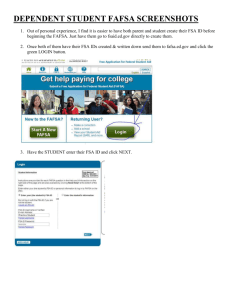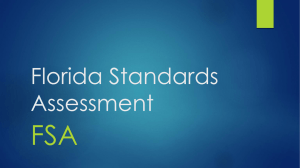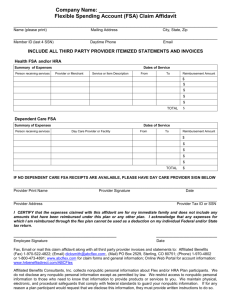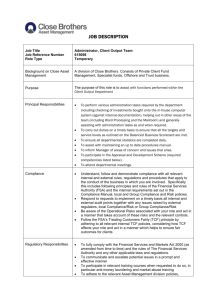Your Flexible Spending Account (FSA) Guide
advertisement
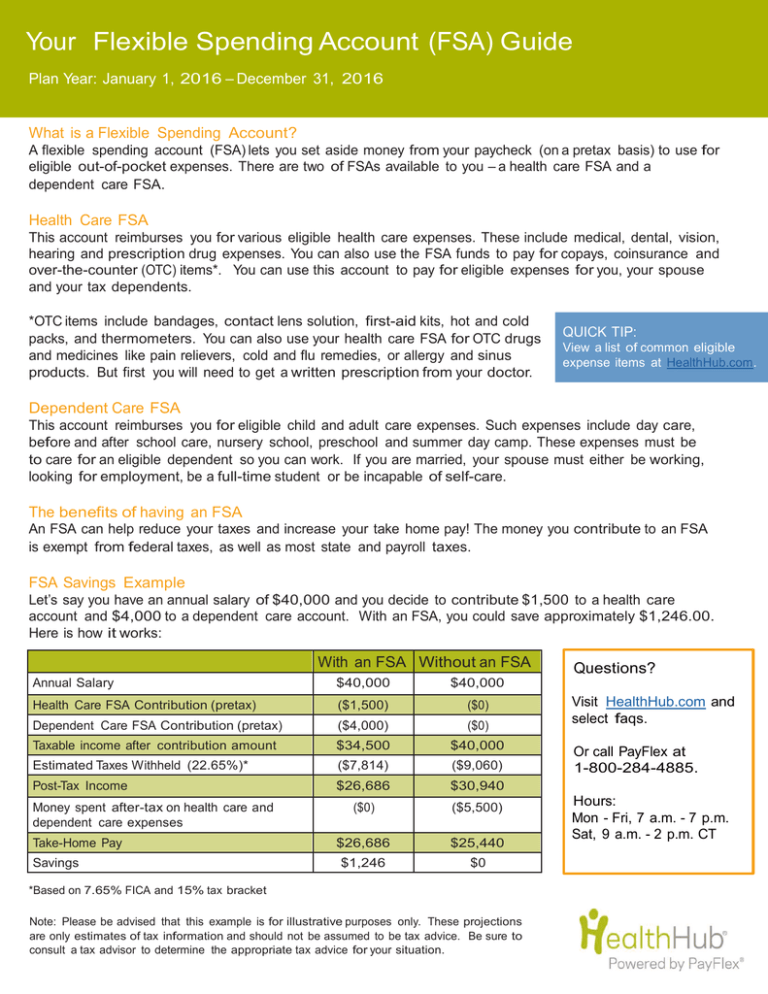
Your Flexible Spending Account (FSA) Guide Plan Year: January 1, 2016 – December 31, 2016 What is a Flexible Spending Account? A flexible spending account (FSA) lets you set aside money from your paycheck (on a pretax basis) to use for eligible out-of-pocket expenses. There are two of FSAs available to you – a health care FSA and a dependent care FSA. Health Care FSA This account reimburses you for various eligible health care expenses. These include medical, dental, vision, hearing and prescription drug expenses. You can also use the FSA funds to pay for copays, coinsurance and over-the-counter (OTC) items*. You can use this account to pay for eligible expenses for you, your spouse and your tax dependents. *OTC items include bandages, contact lens solution, first-aid kits, hot and cold packs, and thermometers. You can also use your health care FSA for OTC drugs and medicines like pain relievers, cold and flu remedies, or allergy and sinus products. But first you will need to get a written prescription from your doctor. QUICK TIP: View a list of common eligible expense items at HealthHub.com. Dependent Care FSA This account reimburses you for eligible child and adult care expenses. Such expenses include day care, before and after school care, nursery school, preschool and summer day camp. These expenses must be to care for an eligible dependent so you can work. If you are married, your spouse must either be working, looking for employment, be a full-time student or be incapable of self-care. The benefits of having an FSA An FSA can help reduce your taxes and increase your take home pay! The money you contribute to an FSA is exempt from federal taxes, as well as most state and payroll taxes. FSA Savings Example Let’s say you have an annual salary of $40,000 and you decide to contribute $1,500 to a health care account and $4,000 to a dependent care account. With an FSA, you could save approximately $1,246.00. Here is how it works: With an FSA Without an FSA Annual Salary $40,000 $40,000 Health Care FSA Contribution (pretax) ($1,500) ($0) Dependent Care FSA Contribution (pretax) ($4,000) ($0) Taxable income after contribution amount $34,500 $40,000 Estimated Taxes Withheld (22.65%)* ($7,814) ($9,060) Post-Tax Income $26,686 $30,940 ($0) ($5,500) $26,686 $25,440 $1,246 $0 Money spent after-tax on health care and dependent care expenses Take-Home Pay Savings *Based on 7.65% FICA and 15% tax bracket Note: Please be advised that this example is for illustrative purposes only. These projections are only estimates of tax information and should not be assumed to be tax advice. Be sure to consult a tax advisor to determine the appropriate tax advice for your situation. Questions? Visit HealthHub.com and select faqs. Or call PayFlex at 1-800-284-4885. Hours: Mon - Fri, 7 a.m. - 7 p.m. Sat, 9 a.m. - 2 p.m. CT FSA contribution limits Account Minimum Contribution Amount Maximum Contribution Amount Health Care FSA $120 $2,550** Dependent Care FSA $120 $5,000*** **If you and your spouse each have a health care FSA, you can each contribute $2,550.00. ***The maximum contribution amount for a dependent care FSA depends on your tax filing status. • If you’re married and filing taxes separately, your contribution limit is $2,500. • If you’re single and head of household, your contribution limit is $5,000. • If you’re married and filing jointly, your contribution limit is 5,000. • If either you or your spouse earn less than $5,000 a year, your contribution limit is equal to the lower of the two incomes. • If your spouse is a full-time student or incapable of self-care, your contribution limit is $3,000 a year for one dependent and $5,000 a year for two or more dependents. Getting started is easy! 1. Decide if you want to enroll in a health care and/or dependent care FSA. 2. Review your expenses from last plan year and think about what you expect to spend this year. We encourage you to use the FSA planning worksheets in this guide or the savings calculator at HealthHub.com to plan your contribution. 3. Now all you need to do is enroll during your annual enrollment period. Your employer will deduct your pretax contributions from your paycheck (in equal amounts during the year) and deposit into your FSA. • If you enroll in a health care FSA, your entire contribution will be available at the beginning of the plan year. • For the dependent care FSA, funds are only available as they are deducted from your paycheck. QUICK TIP: Use the FSA worksheets and savings calculator at HealthHub.com to plan your contribution. 2 Health Care FSA Planning Worksheet Be conservative with your estimates. Any funds left in your account at the end of the plan year will be forfeited. Medical expenses not covered by insurance Annual Estimate Deductibles, copays, coinsurance $ Physician visits/routine exams $ Prescription drugs $ Insulin/syringes $ Annual physicals $ Chiropractic treatments $ Over-the-counter items $ Other: $ Subtotal Medical Expenses: $ Dental expenses not covered by insurance Annual Estimate Checkups/cleanings $ Fillings $ Root canals $ Crowns/bridges/dentures $ Oral surgery $ Orthodontia $ Other: $ Subtotal Dental Expenses: $ Vision/Hearing expenses not covered by insurance Annual Estimate Exams $ Eyeglasses $ Prescription sunglasses $ Contact lenses & cleaning solutions $ Corrective eye surgery (LASIK, cataract, etc.) $ Hearing exams/hearing aids & batteries $ Other: $ Subtotal Vision/Hearing Expenses: $ TOTAL MEDICAL EXPENSES $ Your 2016 Contribution Amount (max = $2,550) $ Number of paychecks you will have in 2016 ÷ Per pay period deduction $ 3 Dependent Care FSA Planning Worksheet Eligible dependent care expenses include day care, before and after school care, preschool, summer day camps, and adult/elder care. Be conservative with your estimates. Any funds left in your account at the end of the plan year will be forfeited. Month Amount January $ February $ March $ April $ May $ June $ July $ August $ September $ October $ November $ December $ TOTAL DEPENDENT CARE EXPENSES $ Your 2016 Contribution Amount (max = $5,000) $ Number of paychecks you will have in 2016 ÷ Per pay period deduction $ How to use your FSA funds Once funds are available in your FSA, you can: Use the PayFlex Card®, your account debit 1. card, to pay for your eligible expenses. If you enroll in a health care FSA, you’ll automatically receive one card before the beginning of the plan year. You can order additional cards for a spouse or dependent at no cost. See page 7 for details. When you use the card, the funds automatically come out of your FSA, if you have funds available. Be sure to save all of your detailed receipts, itemized statements and Explanations of Benefits (EOBs). PayFlex may ask you to provide documentation to verify that you used your card for an eligible expense. Note: The card is not available for the dependent care FSA. QUICK TIP: For fast reimbursements, enroll in direct deposit through HealthHub.com. 2. Pay for eligible expenses with cash, check or a personal credit card, and then submit a claim to PayFlex. You can do this through the PayFlex member website or PayFlex Mobile™ app to pay yourself back. Or you can fill out a paper claim form and fax or mail it to PayFlex®. When you submit a claim, you’ll need to include an EOB, itemized statement or detailed receipt. 3. Pay your provider directly from your FSA. You can use the Pay Them feature to pay your provider for an eligible service you have received during the plan year. This will allow PayFlex to send a check to your provider for the amount you owe. 4 What you need to know about FSAs • The IRS does not allow you to pay your • • medical or other insurance premiums through either type of FSA. You cannot transfer money between FSAs or pay a dependent care expense from your health care FSA or vice versa. FSAs have a use-it-or-lose-it rule. This means you forfeit any unused funds at the end of the plan year. • • • Your plan includes a grace period f o r D e p e n d e n t c a r e o n l y which gives you an additional 2 months a n d 15 days (after the plan year) to use your funds. The last day to spend your Dependent Care FSA dollars is March 15, 2017. You also have a run out period which gives you additional time to submit claims for reimbursement. The last day to submit claims to PayFlex is April 30, 2017. If your employment ends during the 2016 plan year and you have funds available in your FSA, you have 90 days following your termination date to submit eligible claims. Important Dates • • • • • qualifying person. This includes your dependent who is younger than age 13, or a spouse or dependent incapable of self-care. To receive reimbursement, you must be working. If you are married, your spouse must either be working, looking for work, be a full-time student or incapable of self-care. Expenses are reimbursed based on the amount available in your account. Expense reimbursement is for services already received, not for services to be provided in the future. Changing your FSA election You can’t change your contribution unless you have a change in status. This may include a change in one or more of the following: • Legal marital status (marriage, divorce, legal separation, annulment or death of a spouse) • Number of tax dependents (birth, adoption or death) • Employment status that affects eligibility • Dependent satisfying or ceasing to satisfy coverage requirements (reaching limiting age, gain or loss of student status, marriage) Date Plan year start date January 1, 2016 Plan year end date December 31, 2016 Last day to spend your FSA dollars December 31, 2016 Last day to submit claims to PayFlex April 30, 2017 General health care expense information • You can only receive reimbursement for • General dependent care expense information • Dependent care expenses must be for a expenses incurred during the current plan year or grace period for dependent care only. Reimbursement is for eligible expenses incurred by you, your spouse and your dependents. You cannot receive reimbursement for an eligible expense more than once. If you terminate your employment, only claims incurred prior to the date of your termination are reimbursable, unless you elect to continue your health care FSA through COBRA. Remember :You must apply for a change in your election through your employer. You must submit your request within 30 days of your status change date. Specific to a dependent care FSA, you can change your contribution if: • There is a change in your provider • There is a change in the cost for a provider (unless this provider is a relative) For more information Click here to download IRS Publication 502. This document includes important information about: • FSA eligibility – who can enroll in an FSA and who can use the FSA dollars • Eligible expenses – what expenses can be reimbursed through your FSA • Dependent care tax credit options – how to handle claiming tax credits Questions? Visit HealthHub.com and select FAQs. Or call PayFlex at 1-800-284-4885 M-F 7 a.m. – 7 p.m. CT and Sat, 9 a.m. – 2 p.m. CT. Stay connected to your FSA When you have an FSA, you can use the PayFlex member website (HealthHub.com) and the PayFlex Mobile™ app to manage your account and stay up to date on your account activity. It’s time to start taking advantage of all the online features and tools available to you. Get started Once your plan year begins, you can register your account online. • Go to HealthHub.com. Click on Employee Account Login. • Click on Register Now. • Enter your member ID which is your Social Security number. • Also enter your home ZIP code. You may have to enter an employer ID. Please call 1-800-284-4885 for this number. This is only required if there is another user with a similar Member ID or if you happened to work for another employer that offered a PayFlex account. • Click Register. • Create a username and password. Then select a security question and enter an answer. • Enter your e-mail address and click Confirm. View eligible expense items After you log in, the list of common eligible expense items is found in My HealthHub Resources under Planning Tools. View your account balance, deposits and payments • Click on the Financial Center tab. • From the drop-down menu, select the account you wish to view. • To view all of your claims, select Claims. • To view all of your payments and deposits, select Transactions. Account alerts • On My Dashboard you can view your account alerts, if applicable. • These messages can tell you the status of your card, claim information and if you need to provide documentation for card purchases. 6 How to file a claim To pay yourself back for an out-of-pocket expense, log in to HealthHub.com. • Under Quick Links, click on File a Spending Account Claim. If prompted, select Pay Me. • Enter your claim information. To add additional claims, select Add Another Claim. • Once you enter in all of your claims, click Next. • Confirm all expense details and click Next. To make changes, click Previous. • Select Fax or Upload. To “Fax,” click on Create Coversheet. Print and sign the form. Fax it with your documentation to the number on the coversheet. When you sign the fax coversheet, you certify that your claim is for an eligible expense. • To “Upload,” use the Browse button. Select your documentation from your computer. To add additional documents, click on Add Additional Document. Note: Each document must be uploaded in PDF format. Check the signature box to sign your claim and confirm your submission is for eligible expenses. • Click Submit. You can also use Pay Them to pay your health care or dependent care provider directly. • After you log in to HealthHub.com, click on File a Spending Account Claim, under Quick Links. Select Pay Them. • Select your payee from the drop-down menu and click Next. To add a new payee, click on the + symbol. • If you add a new payee, complete all the required fields. Click Save, then click Next. • Enter your contact number, statement date and invoice number (if applicable); patient name; and any comments you may have. Click Next. • Fill in your claim information and click Next. • Verify that your claim information is correct. Click Next. • Select Fax or Upload. To “Fax,” click on Create Coversheet. Print and sign the form. Fax it with your documentation to the number on the coversheet. When you sign the fax coversheet, you certify that your claim is for an eligible expense. • To “Upload,” use the Browse button. Select your documentation from your computer. To add additional documents, click on Add Additional Document. Note: Each document must be uploaded in PDF format. • Click Submit. Note: Be sure to sign up for the “Explanation of Payment” electronic notification through My Settings. This informs you when your claim has been processed. Order an additional PayFlex Card® You can order an additional PayFlex debit card for your spouse or dependent at no cost. • From My Dashboard, under Quick Links select Manage My Debit Card(s). • If you would like to order an additional debit card for a dependent or spouse, select Order A Dependent Debit Card. • Enter the first and last name of your dependent or spouse. Then click Submit. • Your card should arrive within 15 business days. • If your card is lost or stolen, call PayFlex immediately at 1-800-284-4885. Do not order another card online. Sign up for electronic account updates To help you stay up-to-date on your account, we encourage you to sign up to receive notifications through e-mail, on the web or both. • From My Dashboard, select My Settings. • Select Notifications/Email Address. Enter your e-mail address. • Select the notification(s) you wish to receive. Then click Submit. 7 For fast reimbursements, enroll in direct deposit • On the left side of the screen, click on My • • Accounts and Services. Then click on Enroll in Direct Deposit. Select your employer (if applicable) and bank account type. Enter your account number, routing number and bank name. Click Next. Review your account information. If the information is correct, click Confirm. If you need to make a change, click Previous. Stay connected with PayFlex Mobile™ You can also access your account virtually 24/7 through the PayFlex Mobile application. Available from most smartphones, this free* app lets you: • Manage your account funds and submit claims • Receive important account alerts • View your account balance, deposits and payments • View a list of common eligible expense items To get started, download PayFlex Mobile from your mobile app store. To log in to the app, enter the username and password you created on HealthHub.com. If you need help using the app, download the PayFlex Mobile Quick Reference Guide from My HealthHub Resources at HealthHub.com. Questions? Visit HealthHub.com or call PayFlex at 1-800-284-4885. Representatives are available Monday – Friday, 7 a.m. – 7 p.m. CT and Saturday, 9 a.m. – 2 p.m. CT. *Standard text messaging and other rates from your wireless carrier still apply. 8 COBRA What is COBRA continuation coverage? Federal law requires that most group health plans, including health care Flexible Spending Accounts (FSAs); give employees and their families the opportunity to continue their health care coverage when there is a “qualifying event” that would result in a loss of coverage under an employer’s plan. How do I become eligible for COBRA? To be eligible for COBRA coverage, you must have been enrolled in your employer’s health plan when you worked and the health plan must continue to be in effect for active employees. COBRA continuation coverage is available when a qualifying event occurs that would cause an individual to lose his or her health care coverage. You can only elect COBRA for your health care FSA if you contributed funds to your health care FSA through payroll deduction prior to your qualifying event date AND you haven’t been reimbursed more than the amount you contributed. Example: Prior to your qualifying event date, let’s say you: • Elected to contribute $2,500 to a health care FSA for the plan year; • Contributed $500 through payroll deduction; and • Received $200 in reimbursement for your out of pocket expenses. In this situation, you may elect COBRA and continue using your health care FSA for the remainder of the plan year. This is because you contributed more than the amount you were reimbursed, prior to your qualifying event date. Note: Coverage is determined on a month to month basis, unless you plan to make a one-time contribution for the remainder of the plan year. How long will COBRA coverage last for my health care FSA? If you contributed funds to your health care FSA through payroll deduction prior to your qualifying event date AND you haven’t been reimbursed more than the amount you contributed, you can continue COBRA coverage through the end of the plan year. For more information This COBRA section does not fully describe continuation coverage or other rights under the Plan. More information about continuation coverage and your rights under the Plan is available from your employer. You can get a copy of your summary plan description from your employer. For more information about your COBRA rights, the Health Insurance Portability and Accountability Act (HIPAA) and other laws affecting group health plans, contact the U.S. Department of Labor’s Employee Benefits Security Administration (EBSA) in your area or visit the EBSA website at www.dol.gov/ebsa. This material is for informational purposes only and is not an offer of coverage. It contains only a partial, general description of plan benefits or programs and does not constitute a contract. Information is believed to be accurate as of the production date; however, it is subject to change. For more information about PayFlex®, go to HealthHub.com. © 2014 PayFlex Systems USA, Inc. (9/14)
